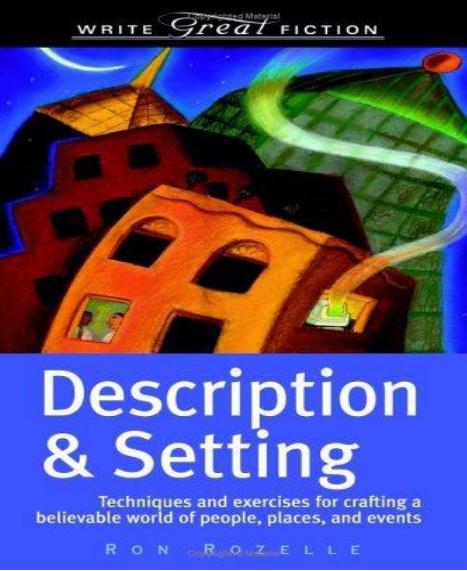Description and Setting by Ron Rozelle

Author:Ron Rozelle [Rozelle, Ron]
Language: eng
Format: epub, pdf
Published: 2011-03-14T07:00:00+00:00
door toward my bed. Shadows darkened. I took a deep breath, closed my eyes and then with all my might sat up. "Who's there?" I cried.
The author uses several of the standard "things that go bump in the night" devices that we all have sensed more than once and not just in reading. The use of them here—the creaking floorboards, the darkening shadows, deep breathing and closed eyes—paints a more vivid picture than simply telling the reader that this character is afraid.
Always look for ways to show rather than tell in your description of a character's mood, as David Guterson does when describing his lonely protagonist in East of the Mountains:
He found a fire ring full of charred fence posts, a rusted coffee can holding dry, leached stones, and a plastic bucket turned upside down, tattered and torn along its flanks where shotgun pellets had passed through it. Two beer bottles were set against a strand of rusting, low barbed wire, and then no further sign of people. Ben felt right in his loneliness. It was just as he had wanted it.
Notice all the remnants that the character sees, leftovers from people who are no longer there—things that are used up and discarded, no longer of any use to anyone. These things reinforce the solitude that this man wants at this point in the story, and this bit of description does a much better job of showing it to the reader than just reporting that he wants to be by himself.
In the Andrews example, the character's mood is implied; in the next one it is identified toward the end as loneliness. There's no rule of thumb for me to give you to help you decide which approach to take other than this one: Avoid starting out with a declaration like He was lonely. It's much more effective to show this to the reader than tell it.
That's not to say it is easier. It would be infinitely easier for a writer to simply tell the reader what kind of mood a character is in. But if you haven't noticed by now that the easier path is hardly ever the best one for a writer, then the odds are that you won't end up being a very good one.
showing a character's flaws
Odysseus was full of himself, brimming with the excessive pride of self that the Greeks called hubris; Achilles had that vulnerable heel; Don Quixote was a dreamer (and arguably a nut); Hamlet could not for the life of him make a decision; and your Uncle Chester can't hold his liquor. Everybody has a flaw.
And your characters better have at least one, too. Perfection is a trait that just doesn't pop up in real people, neither should it in the ones you create.
In The Great Santini, Pat Conroy includes this scene where some children are watching their military father prepare to begin a family outing:
He arranged the things on the dashboard very carefully. On his far left, he stacked three road maps. Beside the maps was a box of Tampa Nuggets cigars, blunt.
Download
This site does not store any files on its server. We only index and link to content provided by other sites. Please contact the content providers to delete copyright contents if any and email us, we'll remove relevant links or contents immediately.
Asking the Right Questions: A Guide to Critical Thinking by M. Neil Browne & Stuart M. Keeley(5775)
Autoboyography by Christina Lauren(5235)
Eat That Frog! by Brian Tracy(4540)
Dialogue by Robert McKee(4403)
Sticky Fingers by Joe Hagan(4198)
Journeys Out of the Body by Robert Monroe(3624)
Annapurna by Maurice Herzog(3467)
Full Circle by Michael Palin(3449)
Schaum's Quick Guide to Writing Great Short Stories by Margaret Lucke(3381)
Elements of Style 2017 by Richard De A'Morelli(3349)
The Art of Dramatic Writing: Its Basis in the Creative Interpretation of Human Motives by Egri Lajos(3067)
Atlas Obscura by Joshua Foer(2962)
Why I Write by George Orwell(2953)
The Fight by Norman Mailer(2940)
The Diviners by Libba Bray(2937)
In Patagonia by Bruce Chatwin(2930)
The Mental Game of Writing: How to Overcome Obstacles, Stay Creative and Productive, and Free Your Mind for Success by James Scott Bell(2908)
Venice by Jan Morris(2573)
The Elements of Style by William Strunk and E. B. White(2473)
